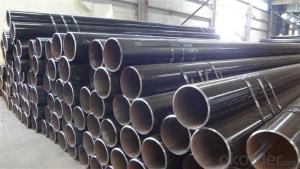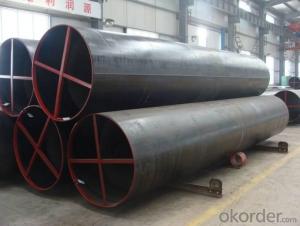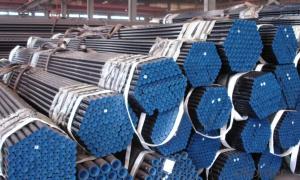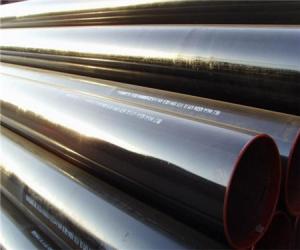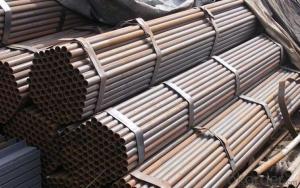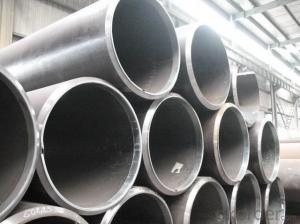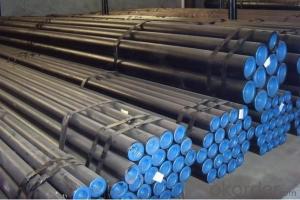LSAW WELDED STEEL TUBE
- Loading Port:
- China Main Port
- Payment Terms:
- TT or LC
- Min Order Qty:
- -
- Supply Capability:
- -
OKorder Service Pledge
OKorder Financial Service
You Might Also Like
1、Structure of Welded Steel Tube:
Welded Steel Tube is formed by drawing a solid billet over a piercing rod to create the hollow shell. We are company that have many years experience and professional manager team and engineer team and sales team, sure we will provide you high quality of welded pipe and professioanl service.
2、Main Features of the Welded Steel Tube:
• High manufacturing accuracy
• The higher strength
• The small inertia resistance
• Strong heat dissipation ability
• Good visual effect
• Satisfy price
3、Welded Steel Tube Specification:
Standard | GB, DIN, ASTM ASTM A106-2006, ASTM A53-2007 |
Grade | 10#-45#, 16Mn 10#, 20#, 45#, 16Mn |
Thickness | 8 - 33 mm |
Section Shape | Round |
Outer Diameter | 133 - 219 mm |
Place of Origin | Shandong, China (Mainland) |
Secondary Or Not | Non-secondary |
Application | Hydraulic Pipe |
Technique | Cold Drawn |
Certification | API |
Surface Treatment | factory state or painted black |
Special Pipe | API Pipe |
Alloy Or Not | Non-alloy |
Length | 5-12M |
Outer Diameter | 21.3-610mm |
Grade | 20#, 45#, Q345, API J55, API K55, API L80, API N80, API P110, A53B |
Standard | ASME, ASTM |
1) Material:20#(ASTM A 106/A53 GRB.API5LGRB,GB),45#,16Mn,10#.
2) Specification range:OD:21.3-610mm,WT:6-70mm,length:6-12m or according to the requirement of clients.
3) Excutive standards:GB,ASME API5L.ASTM A 106/A53,Despite of the above standards,we can also supply seamless steel pipe with standard of DIN,JIS,and so on,and also develop new products according to the requirements of our clients!
4) Surface:black lacquered,varnish coating or galvanized.
5) Ends:Beveled or square cut,plastic capped,painted.
6) Packing:bundles wrapped with strong steel strip,seaworthy packing.
4、Packaging & Delivery
Packaging Details: | seaworthy package,bundles wrapped with strong steel strip |
Delivery Detail: | 15-30days after received 30%TT |
5、FAQ of Welded Steel Tube:
①How is the quality of your products?
We test on every pipe before delivery. Our products are strictly in accordance with international and domestic standard.Guaranteed: If products’ quality is not in accordance with description as we provide or the promise before you place order, we promise 100% refund.
②How about the price?
Yes, we are factory and be capable of offering you the lowest price. One of our policy is that “ to save time and be absolutely honest with our business relationship, we quote as low as possible for every client, and discount can be given according to the quantity”, if you are interested in bargain and dissatisfy our factory price, just don’t waste your time. Our quotation is professional.
③Why should you choose us?
Choice happens because of our quality and price. Our service formula: good quality + good price + good service=customer’s trust.
6、 Welded Steel Tube Images:
- Q: DN80 seamless steel tube, what is the standard thickness?
- The DN80 specification is 89*6 seamless steel management formula = (outside diameter wall thickness) * wall thickness *0.02466= per meter weight
- Q: What is the thermal conductivity of steel pipes?
- The thermal conductivity of steel pipes can vary depending on the specific type of steel used and its composition. However, on average, the thermal conductivity of steel pipes is around 50-60 watts per meter-kelvin (W/mK). This means that steel pipes are relatively good conductors of heat, allowing for efficient transfer of thermal energy. The high thermal conductivity of steel pipes makes them suitable for various applications, including heating systems, industrial processes, and infrastructure projects where heat transfer is essential.
- Q: What are the common methods for repairing steel pipes?
- There are several common methods for repairing steel pipes, depending on the nature and extent of the damage. One common method is welding, which involves melting the damaged area and fusing it with a new piece of steel. This method is often used for small cracks or holes in the pipe. Welding can be done using various techniques such as shielded metal arc welding (SMAW), gas metal arc welding (GMAW), or tungsten inert gas (TIG) welding. Another method is pipe wrapping or bandaging, which involves wrapping a layer of adhesive tape or resin-soaked fiberglass around the damaged section of the pipe. This method is suitable for small leaks or corrosion spots and provides a temporary fix until a more permanent solution can be implemented. If the damage is extensive or the pipe is severely corroded, pipe lining or relining may be necessary. This involves inserting a new pipe liner inside the existing one, effectively creating a new pipe within the old one. This method can be done using various materials such as epoxy, polyethylene, or cured-in-place pipe (CIPP). Pipe lining is commonly used for larger diameter pipes or when replacement is not feasible. In some cases, pipe clamps or sleeves can be employed to repair minor leaks or cracks. These devices are designed to be clamped around the damaged section and provide a temporary or permanent solution depending on the severity of the damage. Ultimately, the choice of repair method depends on factors such as the extent of damage, accessibility of the damaged area, budget constraints, and the long-term durability required. It is advisable to consult with a professional pipe repair specialist to assess the specific situation and determine the most suitable method for repairing steel pipes.
- Q: How do you calculate the flow rate in a steel pipe?
- When calculating the flow rate in a steel pipe, several factors must be taken into consideration. The primary factor to consider is the cross-sectional area of the pipe, which can be determined using the formula A = πr², where A represents the cross-sectional area and r represents the radius of the pipe. Afterwards, it is necessary to ascertain the velocity of the fluid moving through the pipe. This can be accomplished by utilizing the equation v = Q/A, where v denotes the velocity, Q represents the volumetric flow rate, and A represents the cross-sectional area of the pipe. To determine the volumetric flow rate, one can employ the equation Q = AV, where Q represents the volumetric flow rate, A represents the cross-sectional area, and V represents the average velocity of the fluid. Furthermore, it is essential to take into account the properties of the fluid being transported through the pipe. Factors such as density and viscosity can impact the flow rate. In conclusion, the flow rate in a steel pipe can be calculated by determining the cross-sectional area of the pipe, calculating the velocity of the fluid, and considering the properties of the fluid being transported.
- Q: Can steel pipes be used for transporting hazardous materials?
- Yes, steel pipes can be used for transporting hazardous materials. Steel is known for its strength and durability, making it suitable for handling and containing hazardous substances. It is commonly used in various industries, such as oil and gas, chemical, and wastewater treatment, to transport materials that pose a potential risk to human health or the environment. Additionally, steel pipes can resist corrosion and high pressure, ensuring the safe transportation of hazardous materials.
- Q: What is the difference between ERW (Electric Resistance Welded) and LSAW (Longitudinal Submerged Arc Welded) steel pipes?
- ERW steel pipes are manufactured by high-frequency electrical currents passing through the metal, resulting in a welded joint. On the other hand, LSAW steel pipes are produced by submerging a metal plate into a welding zone, creating a welded joint through the use of a welding arc. The main difference lies in the welding process, with ERW pipes being more suitable for small to medium-sized diameters, while LSAW pipes are commonly used for larger diameter and thicker-walled applications.
- Q: How are steel pipes affected by international trade policies?
- Steel pipes can be significantly affected by international trade policies. For instance, trade barriers such as tariffs or quotas can increase the cost of importing steel pipes, making them less competitive compared to domestically produced pipes. Conversely, liberalized trade policies can enhance market access for steel pipe exporters, allowing them to expand their market share globally. Overall, the impact of international trade policies on steel pipes depends on the specific policies implemented and their effect on the cost, availability, and competitiveness of these products in the international market.
- Q: Are steel pipes suitable for underground gas distribution?
- Yes, steel pipes are suitable for underground gas distribution. They have a high tensile strength, corrosion resistance, and can withstand extreme temperatures, making them an ideal choice for transporting natural gas underground. Additionally, steel pipes are durable and have a long lifespan, making them a reliable option for gas distribution systems.
- Q: What are the challenges faced in transporting steel pipes?
- Transporting steel pipes can pose several challenges. Firstly, steel pipes are heavy and bulky, making them difficult to handle and load onto transportation vehicles. Specialized equipment, such as cranes or forklifts, is often required to safely lift and maneuver the pipes. Secondly, steel pipes are susceptible to damage during transport. They can be easily scratched, dented, or bent if not properly secured. This necessitates careful packaging and securing techniques to prevent any deformation or damage during transit. Additionally, steel pipes are prone to corrosion, especially when exposed to moisture or harsh weather conditions. Therefore, protecting the pipes from moisture and maintaining proper storage conditions during transportation is crucial to prevent rusting and maintain their quality. Furthermore, the length of steel pipes can also present challenges. Depending on their size, some pipes may be too long to fit on standard transportation vehicles. This requires the use of specialized trailers or the pipes may need to be cut into smaller sections, which can add complexity and cost to the transport process. Lastly, the cost of transporting steel pipes can be high due to their weight and size. Freight charges can be expensive, especially for long-distance transportation. Thus, finding cost-effective transportation solutions while ensuring the safety and integrity of the pipes is a constant challenge in the industry.
- Q: What are the safety considerations while handling steel pipes?
- When handling steel pipes, some key safety considerations include wearing appropriate personal protective equipment (PPE) such as gloves, safety glasses, and steel-toe boots to protect against potential injuries. It is important to be cautious of the weight and size of the pipes, using proper lifting techniques and equipment to prevent strains or accidents. Additionally, workers should be mindful of the sharp edges and potential for cuts or punctures, ensuring they have a clear and organized workspace to minimize the risk of tripping or falling. Regular inspections of the pipes for any damages or defects are also crucial to prevent accidents and maintain a safe working environment.
Send your message to us
LSAW WELDED STEEL TUBE
- Loading Port:
- China Main Port
- Payment Terms:
- TT or LC
- Min Order Qty:
- -
- Supply Capability:
- -
OKorder Service Pledge
OKorder Financial Service
Similar products
Hot products
Hot Searches
Related keywords
